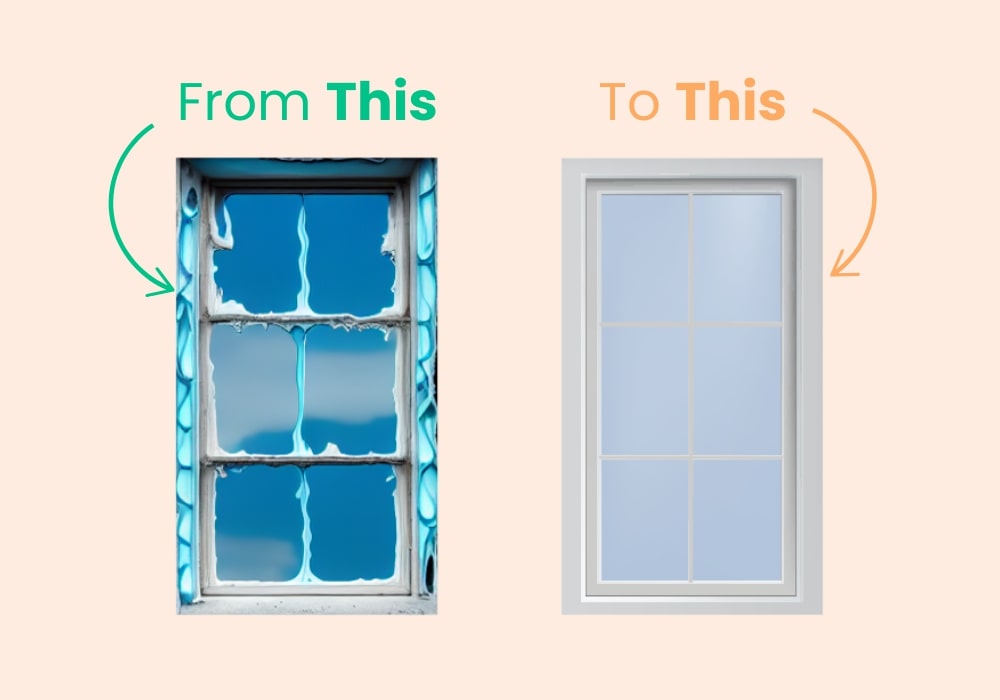Is Replacing All Windows Cheaper? Discover the costs, savings, and expert tips to transform your home with a budget-friendly window upgrade!
Understanding window replacement costs is crucial for homeowners planning to upgrade their homes. Replacing windows is a big investment, offering energy savings, better looks, and increased property value. Knowing the window replacement cost helps you budget wisely and avoid unexpected expenses.
One common question is: “How much does window replacement cost?” The answer depends on factors like window material, style, and labor. Replacing all your windows at once can save you money. By bundling the replacement process, you often benefit from bulk discounts and reduced labor costs.
In this guide, we’ll explore all you need to know about window replacement costs and how to make this upgrade budget-friendly and impactful.
What Is the Average Window Replacement Cost in 2024?
The average cost to replace windows ranges between $300 and $1,200 per window.
The average window replacement cost in 2024 ranges between $300 and $1,200 per window, depending on material, style, and labor. Here’s a quick guide to help you plan.
Cost by Window Material
Window material plays a significant role in determining cost, durability, and maintenance:
- Vinyl Windows: These are the most budget-friendly, costing between $300 and $600 per window. They’re durable, low-maintenance, and energy-efficient.
- Wood Windows: Wood windows are a premium choice, ranging from $800 to $1,500. While they offer timeless aesthetics, they require regular upkeep.
- Aluminum Windows: Priced between $400 and $1,000, aluminum is sleek but less insulating.
- Fiberglass Windows: Costing $500 to $1,200, fiberglass is a top-tier option for durability and insulation.
- Composite windows: A blend of wood and vinyl for durability and efficiency, priced between $800 and $1,400 per window.
Cost by Window Style
The style of the window affects both the upfront cost and installation complexity:
- Single-hung windows: Typically cost $300 to $600, making them one of the most affordable styles.
- Double-hung windows: A popular mid-range option, costing $400 to $800.
- Bay and bow windows: Due to their size and complexity, these are luxurious and expansive and cost $1,500 to $4,000.
- Picture windows: Large, fixed-pane windows for unobstructed views, costing $800 to $2,000 per window.
- Sliding windows: Practical for modern homes, priced at $450 to $800 per window.
- Casement windows: Energy-efficient with a modern look, priced at $300 to $1,000.
- Custom or specialty windows: Unique designs tailored to your home can cost $2,000 or more per window.
Labor Costs by Region:
- Urban areas: Higher installation fees due to labor demand and cost of living.
- Suburban and rural areas: Typically lower labor rates, though the availability of skilled professionals may vary.
What Factors Determine the Total Window Replacement Cost?
The total window replacement cost depends on window type, material, size, installation complexity, and regional labor rates.
Size and Design Complexity
Window Size:
Larger windows require more materials and labor, increasing costs. A standard single-hung window may cost significantly less than a custom floor-to-ceiling window.
Design Complexity:
- Custom Shapes: Uncommon shapes like circular or trapezoidal windows are more expensive due to manufacturing challenges.
- Special Features: Add-ons like grids, Low-E coatings, or tinted glass will increase costs.
Example: A plain 36″ x 60″ window might cost $500, while a custom arched window could cost $1,500 or more.
Installation Labor
DIY vs. Professional Installation:
- DIY Installation: While doing it yourself may save on labor costs, it can lead to problems like improper sealing or voided warranties. DIY kits for basic windows start at $100 to $300 but require tools, time, and skills.
- Professional Installation: Hiring experts ensure proper fitting and efficiency but adds to the overall cost. Depending on complexity, labor fees typically range from $150 to $300 per window.
Special Scenarios:
- Removing old windows or repairing damaged frames adds $50 to $200 per window.
- Structural adjustments for non-standard sizes can escalate labor costs.
Location and Accessibility
Home Location:
- Urban areas typically have higher labor costs due to the higher cost of living and demand for skilled professionals.
- Rural areas may offer lower rates, but finding a qualified contractor could be challenging.
Window Accessibility:
- Windows on upper floors or hard-to-reach areas increase labor time and require special equipment, adding 10-20% to the total cost.
- Basement windows or those blocked by landscaping may also require extra preparation and labor.
Additional Factors to Consider
Material Choice:
Materials like wood and fiberglass cost more but offer greater durability and energy efficiency.
Energy-Efficient Options:
Double-pane or triple-pane windows and Low-E coatings increase upfront costs but reduce utility bills over time.
Timing of the Project:
Replacing windows during the off-season may reduce installation costs.
Is Replacing All Windows Cheaper Than Replacing Them Individually?
Yes, replacing all windows can be more cost-effective due to bulk discounts and reduced labor costs.
Let’s explore why replacing all windows at once might save you money and when it might not.
Economies of Scale When Buying in Bulk
Lower Per-Window Costs:
Window suppliers and contractors often offer discounts for bulk purchases. For example, buying ten windows at once could lower the per-unit cost by 10-15% compared to replacing one at a time.
Streamlined Labor Costs:
- Hiring a professional team to replace all windows at once minimizes the number of site visits reducing overall labor charges.
- Installing multiple windows in one project is more efficient, reducing hourly labor costs.
Example: Replacing one window might cost $500, but replacing ten windows could cost $4,500, saving you $500 on the total project.
Long-Term Savings from Improved Energy Efficiency
Energy Cost Reduction:
Upgrading all windows to energy-efficient models can significantly lower heating and cooling bills. Homes with energy-efficient windows can save up to $500 annually on utility costs.
Consistent Indoor Comfort:
- Replacing all windows ensures uniform insulation, eliminating drafts or cold spots that could occur with partial replacements.
- Improved comfort can also add to your home’s resale value, making it a worthwhile investment.
Bonus: Energy-efficient upgrades may qualify for tax credits or rebates further reducing the total project cost.
Pros and Cons of Phased Replacements vs. Full-House Replacements
Full-House Replacement (All Windows at Once)
Pros:
- Cost Savings: Bulk discounts and fewer labor hours reduce the overall project cost.
- Time Efficiency: Completing the project in one go minimizes disruptions to your daily life.
- Uniform Aesthetic: Installing all-new windows together gives your home a cohesive look.
Cons:
- Higher Upfront Cost: Replacing all windows together requires a larger immediate budget.
- Longer Project Duration: While efficient in the long term, replacing all windows may take longer than one or two replacements.
Phased Replacement (One or Few Windows at a Time)
Pros:
- Budget Flexibility: Homeowners with limited funds can manage better by spreading the cost over time.
- Prioritize High-Need Areas: Replace windows in the most worn-out or energy-inefficient areas.
Cons:
- Higher Per-Window Cost: Smaller-scale projects don’t qualify for bulk discounts.
- Uneven Efficiency: Old, inefficient windows can offset the benefits of new ones, limiting energy savings.
How Does Window Material Affect Replacement Cost?
Material choice impacts durability, insulation, and price, with vinyl being the most cost-effective.
The window material you choose plays a crucial role in determining both the cost and the lifespan of your windows. Each material has unique pros and cons, affecting cost, maintenance, and energy efficiency. Here’s how the most common materials affect the total window replacement cost:
Vinyl Windows: Affordable and Low Maintenance
Vinyl windows are the most budget-friendly option, with costs ranging from $300 to $600 per window. They are durable, warp-resistant, and low-maintenance. Their excellent insulation properties make them energy-efficient, reducing heating and cooling bills. However, vinyl windows lack the sophisticated appearance of wood, which might not suit luxury or historic homes.
Wood Windows: Classic Beauty at a Higher Cost
Wood windows offer a timeless aesthetic, making them ideal for traditional or high-end homes. Prices range from $800 to $1,500 per window, reflecting their premium appeal. Wood is a great insulator, providing excellent energy efficiency. However, regular painting or staining is required to avoid rot and warping. Wood’s high maintenance and cost make it less practical for budget-conscious homeowners.
Fiberglass Windows: Durable and Energy-Efficient
Fiberglass windows balance cost and performance between $500 and $1,200 per window. Fiberglass windows are stronger, weather-resistant, and outlast vinyl or wood. They mimic the look of wood without the high maintenance, offering a stylish yet practical choice. Despite their benefits, fiberglass windows are pricier upfront and may not be readily available in all regions.
Aluminum Windows: Sleek but Less Efficient
Aluminum windows suit modern homes, costing between $400 and $1,000 per window. They are lightweight, strong, and perfect for large or custom designs. However, aluminum is less energy-efficient, as it conducts heat and cold more readily than other materials. This can lead to higher energy bills over time. Additionally, aluminum windows are prone to condensation and corrosion, especially in humid climates.
Key Considerations When Choosing Materials
- Budget: Vinyl is the most cost-effective, while wood and fiberglass cater to homeowners willing to invest in durability or aesthetics.
- Climate: Fiberglass and wood perform well in extreme temperatures, while aluminum is better suited for milder climates.
- Maintenance: Choose vinyl or fiberglass for minimal upkeep; opt for wood if you’re willing to invest time and effort in maintenance.
How Can You Reduce the Overall Window Replacement Cost?
You can reduce window replacement costs by choosing less expensive materials, comparing quotes, and replacing multiple windows simultaneously.
Reducing the overall window replacement cost is possible by using smart strategies that save money without sacrificing quality. Timing your replacements and exploring financing and design options can make the project more affordable. Here’s how:
Time Your Replacements During Off-Peak Seasons
Window replacement services are in higher demand during spring and summer, which can drive up prices. Scheduling your project during the off-peak seasons, like late fall or winter, may lead to significant discounts. Contractors are often more willing to offer better deals during slower months to secure business.
Example: Replacing windows in December instead of June might save you 10-20% on labor and materials.
Explore Financing Options, Tax Incentives, or Rebates
Paying for a large-scale replacement upfront can be challenging, but there are options to ease the financial burden:
- Financing Plans: Many window replacement companies offer installment options, allowing you to spread payments over time.
- Tax Incentives and Rebates: Check for government programs or utility rebates that reward energy-efficient upgrades. For example, ENERGY STAR-certified windows often qualify for federal tax credits, saving you hundreds.
Pro Tip: Ask your contractor about available incentives—they may guide you toward programs you didn’t know existed.
Choose Standard Sizes Over Custom Designs
Custom-sized or uniquely shaped windows can be significantly more expensive due to specialized manufacturing processes. Opting for standard-sized windows instead of custom designs can save a substantial amount:
- Standard sizes are mass-produced, which reduces their cost.
- They’re easier to install, lowering labor costs as well.
Example: A standard 36″ x 60″ vinyl window might cost $300-$600, while a custom design could exceed $1,200.
Pro Tip: Bundling your window replacement with other home improvement projects can also lead to lower costs.
What Are the Benefits of Replacing All Windows at Once?
Comprehensive replacements can save money and enhance home comfort.
Replacing all windows simultaneously offers several advantages, from cost savings to improved home comfort and value. While the upfront investment might seem significant, the long-term benefits make this approach a smart choice for many homeowners.
Improved Energy Efficiency Means Lower Utility Bills
Replacing all windows simultaneously ensures your home benefits from modern, energy-efficient designs. This leads to:
- Consistent Insulation: Eliminating drafts and heat loss in every room keeps your home at a stable temperature.
- Lower Energy Bills: Energy-efficient windows, like those with double-pane or Low-E glass, can reduce heating and cooling costs by up to 25% annually.
- Environmental Impact: Upgrading all windows reduces your home’s carbon footprint by lowering energy consumption.
Example: Homeowners with older windows could save $500 or more annually by upgrading to energy-efficient models.
Consistent Aesthetic Across the House
When you replace all your windows simultaneously, your home gains a cohesive and updated appearance. Benefits include:
- Enhanced Curb Appeal: Uniform window styles, colors, and materials make your home look modern and well-maintained.
- Interior Harmony: Matching windows inside creates a balanced and visually appealing living space.
- Streamlined Maintenance: Dealing with one type of window across the house simplifies cleaning and repairs.
Pro Tip: Choose a style that complements your home’s architecture for maximum visual impact.
Increased Home Value for Resale Purposes
Window replacement is a high-return investment that boosts your property’s resale value. Real estate experts often highlight the benefits of full-house upgrades, including:
- Higher Market Appeal: Buyers prefer homes with recent, energy-efficient improvements.
- ROI Boost: Homeowners can recoup up to 70% of their investment in full window replacements when selling.
- Reduced Negotiations: Newly replaced windows give potential buyers peace of mind, minimizing price negotiations related to repairs or upgrades.
Example: A home with a $10,000 full-house window replacement could see a $7,000 increase in resale value.
Why a Full Replacement Is More Cost-Effective?
- Bulk Discounts: Contractors and suppliers often offer significant savings for larger projects.
- Time Savings: Completing the project simultaneously reduces labor hours and installation disruptions.
- Long-Term Benefits: Replacing all windows eliminates the need for future piecemeal upgrades, saving you money on incremental labor costs.
FAQs
How Long Does It Take to Replace All Windows in a Home?
Replacing all windows typically takes one to three days, depending on the size and complexity of the project.
Are Energy-Efficient Windows Worth the Investment?
Yes, energy-efficient windows reduce utility bills, enhance comfort, and often qualify for tax credits or rebates.
What Is the Lifespan of Replacement Windows?
High-quality replacement windows last 20 to 30 years, depending on material and maintenance.
Can I Replace My Windows One at a Time?
Yes, but replacing all windows at once is often more cost-effective and improves overall energy efficiency.
Does Replacing Windows Increase Home Security?
Yes, modern windows with advanced locking systems and durable materials provide improved safety and security.

Transform Your Space with Reliable Window and Door Solutions
At Reli Solutions Inc., we offer expert window and door replacement services to boost your home’s beauty, efficiency, and security. Whether you’re upgrading to energy-efficient windows, installing stylish new doors, or repairing existing structures, our team delivers expert craftsmanship and outstanding customer service every step of the way.
Our Services Include:
- Window Replacement: Offering a wide range of materials, including energy-efficient options, to suit every style and budget.
- Door Installation & Replacement: We offer quality installation of entry and patio doors, prioritizing security and aesthetics.
- Custom Solutions: Custom installations to ensure your space looks and functions as you envision.
- Repairs & Maintenance: Keeping your windows and doors in prime condition with expert repairs and regular upkeep.
Let us help you make your home more beautiful, comfortable, and efficient. Contact us today for a free consultation and discover how we can transform your space!

